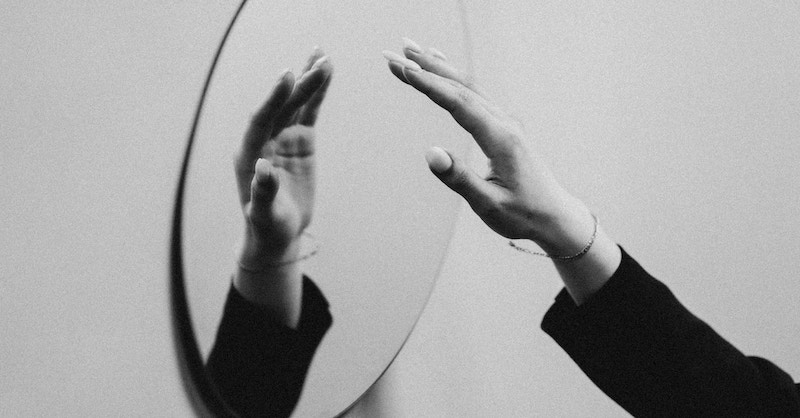MIRROR
I am silver and exact.
I have no preconceptions.
Whatever I see I swallow immediately
Just as it is, unmisted by love or dislike.
I am not cruel, only truthful‚
The eye of a little god, four-cornered.
Most of the time I meditate on the opposite wall.
It is pink, with speckles.
I have looked at it so long
I think it is part of my heart.
But it flickers.
Faces and darkness separate us over and over.
I have no preconceptions.
Whatever I see I swallow immediately
Just as it is, unmisted by love or dislike.
I am not cruel, only truthful‚
The eye of a little god, four-cornered.
Most of the time I meditate on the opposite wall.
It is pink, with speckles.
I have looked at it so long
I think it is part of my heart.
But it flickers.
Faces and darkness separate us over and over.

Now I am a lake.
A woman bends over me,
Searching my reaches for what she really is.
Then she turns to those liars,
the candles or the moon.
I see her back, and reflect it faithfully.
She rewards me with tears and an agitation of hands.
I am important to her.
She comes and goes.
Each morning it is her face that replaces the darkness.
In me she has drowned a young girl,
and in me an old woman
Rises toward her day after day, like a terrible fish.
A woman bends over me,
Searching my reaches for what she really is.
Then she turns to those liars,
the candles or the moon.
I see her back, and reflect it faithfully.
She rewards me with tears and an agitation of hands.
I am important to her.
She comes and goes.
Each morning it is her face that replaces the darkness.
In me she has drowned a young girl,
and in me an old woman
Rises toward her day after day, like a terrible fish.
Review and analysis of the poem by Okoro Amarachi
This is a poem of two stanzas with black verse written by Sylvia Plath, that explores the tumultuous nature of identity, presenting a mirror as an impartial observer that reflects the truth without judgment. The theme of poem centered on aging, appearance, Identity, time, and mortality reflecting back on experience.
Mirror" is a personification poem. That is, the poet has given the mirror a first-person voice. So the poem begins: I am silver and exact. The mirror becomes the reflective surface of a lake over which a woman leans, looking intently into the water's depths for some hint of who she is inside. The mirror insists that it objectively reflects the truth—a truth that greets the woman who looks in the mirror each day as a "terrible" reminder of her own mortality. She searches the mirror for an image that reflects the way she sees herself and feels inside, yet finds only an increasingly older woman staring back (see Lines 1-5, Lines 14-18).
It is important to note the objectivity of the mirror, which is only capable of reflecting what it sees. The mirror describes itself as “the eye of a little god.” Like a god, the mirror sees things exactly as they are. Also, the mirror’s objectivity served as a reminder of her own mortality. As time passes, she ages and becomes further removed from her youth while getting ever closer to death. This disconnect between how she feels inside and the harsh reality of the mirror highlights the horror and difficulty of confronting aging and because aging inevitably leads to death the idea of mortality. There are so many figurative devise applied in the poem, however, the use of metaphor and personification is seen very well the poem.
Personally, I believe the poem passes a crucial message or lesson to the youth, shading light about the passage of time and embrace our true identity and facing our reality.
photo credit: goggle

